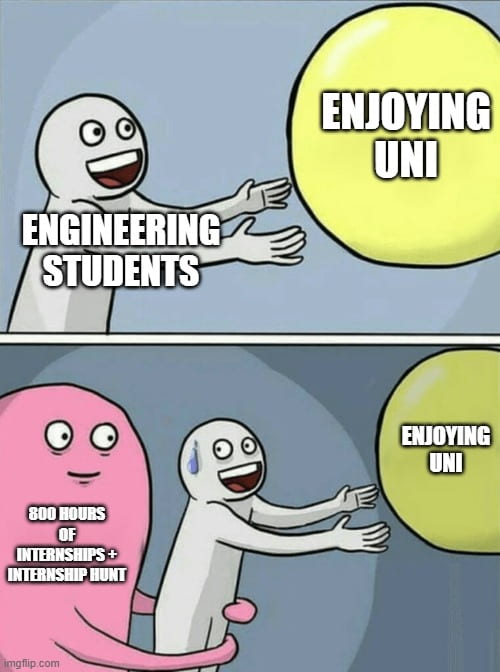Hola hola, back again with another BME insight – now for internships!
I know what you’re thinking – “Oh xyz from Part 2/3/4 said to not do BME because they don’t get internships and its like, sad” and that all BMEs look like this:
“internship plz…”

Well, they are so wrong! It is my civic duty here today to delve deep into the world of BME internships (and how we actually have a more diverse range of opportunities than the rest!)
✮ ⋆ ˚。𖦹 ⋆。°✩ ⋆ ˚。𖦹 ⋆。°✩ ⋆ ˚。𖦹 ⋆。°✩ ⋆ ˚。𖦹 ⋆。° BME INTERNSHIPS ✮ ⋆ ˚。𖦹 ⋆。°✩ ⋆ ˚。𖦹 ⋆。°✩ ⋆ ˚。𖦹 ⋆。°✩⋆ ˚。𖦹 ⋆。°✩
5 main types of Internships available to BME are:
- Product Development
- Software Development
- Quality and Regulatory
- Clinical
- Summer Research Scholarships
Existing in:
- Big Company
- Start-ups
- Auckland Bioengineering Institute
Let’s get right into it!
PRODUCT DEVELOPMENT
This role primarily involves assisting in creating, implementing and refining a biomedical engineering product. On the spectrum of engineering to medical knowledge, this leans on the more engineering side.
Some examples of work you could be doing:
- Designing or refining the product on CAD software
- Designing the electronics/circuitry of the product on Altium or other similar software
- Creating programs for the product (coding yay)
- Creating algorithms to process physiological data
Generally – bioinstrumentation galore. A large part of bioinstrumentation focuses on sensors that can accurately capture human measurements eg gut signals, so knowledge of the 101 ADC electronics would be good. I believe product development is the most popular BME job as it’s the most engineering aligned of the BME work.
SOFTWARE DEVELOPMENT
Some BME companies focus on building programs to better aid hospitals and clinics. This could involve
- streamlining physiological reporting to make it super intuitive for clinicians
- building and maintaining data frameworks and pipelines for healthcare providers
- or building apps that well, aid healthcare related issues.
While these aren’t very ‘biomedical engineering’ aligned per se, by the time you get to internship applying time, you should have 3 languages under your belt: Python, C and Matlab. So don’t be discouraged from applying for these! I know a lot of BME who have gotten these roles, so its entirely possible.
Note: For any type of software development role, and I can’t stress this enough, do your own projects! Firstly, not that hard – look up a youtube tutorial and spin off from there. For more guaranteed success, make the effort to learn the languages commonly used in industry – TypeScript is one I find fairly common. Web development languages are also a big plus.
QUALITY AND REGULATORY
Not many people know about these, but these are essentially a nice blend of clinical and engineering knowledge all bundled up in having good communication and writing. Most BME companies do love Biomedical Engineers specifically for this – so hey, less competition! Quality and Regulatory is an integral part of any company that looks to sell things – medtech is a highly regulated industry and companies are always seeking for help to make sure their products are compliant (aka, you don’t shock the lights out of anybody with your circuitry, etc).
This role could involve
- Implementing and managing a Quality Management System (err, can’t tell you what this means to be honest, assuming its something like document control etc)
- Writing up Ethics applications to the ethics committee
- Writing up Product descriptions and specifications in proper documentation
- Maintaining the quality of the product – could include both software and hardware if your company needs it.
Well, as you can see, this role is a LOT of writing. I understand this may not be the typical engineers fancy, but personally, I adore this role for its varied skill set and that opportunity to learn so many skills at once. And I still get to use my engineering AND clinical knowledge – and also write! Do consider applying, many opportunities + literally who else is gonna do it lol
CLINICAL
Biomedical Engineers may actually favoured for clinical positions as we (are supposed to have) really good analytical skills, perhaps even more so compared to our health science brethren. We also still do medical core papers, so we have enough medical knowledge to get by.
Main role is primarily analysing clinical data, and generating reports from it. Could be either reading data from imaging, or be in the laboratory playing with funny chemicals. Whatever rocks your world!
SUMMER RESEARCH
This is a unique opportunity to be an understudy of a researcher and assist them in some of the most groundbreaking research projects. I am Auckland Bioengineering Institute’s number 1 hypeman, and was so wowed by the sheer amount of crazy stuff and knowledge that is brewed up at 70 Symonds, so I highly endorse applying for a Summer Research Scholarship when they open late July and close Early-Mid Aug.
You can browse this years projects here: https://www.auckland.ac.nz/en/study/scholarships-and-awards/scholarship-types/undergraduate-scholarships/summer-research-scholarships/summer-research-projects/auckland-bioengineering-institute.html
Note: The pay from this scholarship is typically less than what you’d earn over a 400-hour internship period. Nonetheless, still a great opportunity, especially if you see yourself doing post-grad or academia!
Also note: Very. GPA. Dependent. They’ll literally sort by GPA and pick from there – don’t let it discourage you though, as long as you’re above the minimum GPA req (6) you have a shot! There are also 2 rounds of intake after the first lot of people choose to reject their positions.
Now for the famed debate, Big Company vs Start-up?
Big Company:
Pros:
- Have great mentoring programs for interns
- Big Names more internationally recognised overseas
- Opportunities to progress onto grad roles more common
- Big teams, if that’s your thing
Cons
- Big teams, if that’s not your thing
- Less responsibility within the company possibly…
- More formal workplace culture oops
Start-up
Pros:
- More responsibility in terms of role
- Small and close team
- Almost always pay well (26 an hour thanks to Callaghan Innovation who funds the startup internships)
- Unique opportunities in groundbreaking areas
Cons:
- May not have established mentor programs
- Uncertainty when it comes to product success (usually goes well though)
- People do say less networking but I digress. The startups are all well connected because they all started in the ABI, so you may actually have better networking opportunities in startups compared to big companies… so not a con really
Whatever floats your boat people! But personally, I love the start-up culture for the sheer challenge of pushing thins to market. It’s so cool directly experiencing research being turned into product, and I quite like the small but tight company culture too.
Internship Hunt Tips
I’m sure everyone and their momma has given internship tips, but here I am with mine hehe – BME specific, because our world is different to the rest
(1) Keep a living document of your strengths, passions, projects, etc anything that would be good for interviews and cover letters
- For me, this was a mindmap where I kept dumping things about myself. Great for pulling out bits to fit each job your applying for. Especially for BME, where passion reflects well on your applications, keep a little spiel about BME on every cover letter if you can.
- Miro does great mindmaps.
- Talk to your friends about the strengths they see in you for a cute wholesome moment hehe
(2) Start early, but BME internship season lasts LONG.
- BME internships typically start around July, but some applications still are ongoing till late September. If come the end of August and everyone seems to have an internship but you, don’t be discouraged – there’s some more chances out there! The bulk of applications was in August, so to be smart, start making your materials in intersem, but probably even before that.
(3) All experience is worthy to talk about!
- I find that speaking about my experiences at my random part-time job was more beneficial to my interviews than talking about the same projects that like 4 other applicants probably also talked about.
(4) If you can, research your interviewers!
(5) Be yourself and play to your strengths!
- For me, that looked like having a role that had a varied skill set. Might help to have a niche and play into it really well – for me this was communication, which was super in demand for Q&R jobs.
(6) Apply even if you think you’re not perfect for it. Who knows what could happen?
(7) Keep a log of every possible company you could apply for and track application due dates.
- I wish I took this advice more seriously – I had one, but didn’t pay attention and missed a bunch of due dates at companies I wanted to work for.
(8) Not all interviews will be a Q&A type. Some might even be quite conversational, and if you can keep the conversation going smooth, you’ll get a good shot at the role.
And final tip, you guys are superstars – as long as you have the heart for it, I’m sure you can do it! Keep slaying my friends and I’ll see you in my last post for the sem eeeeeeeek
See ya later ally gators!
